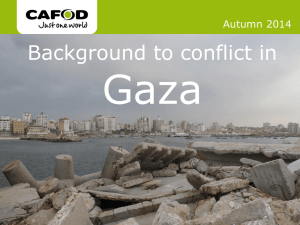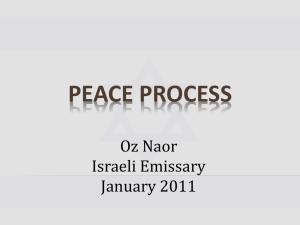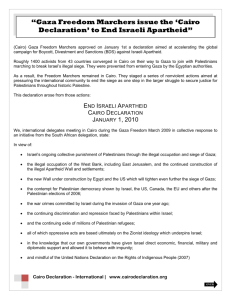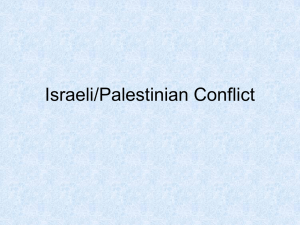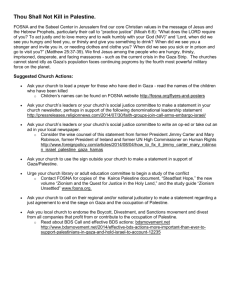Gaza First 2004 - University of Hull
advertisement
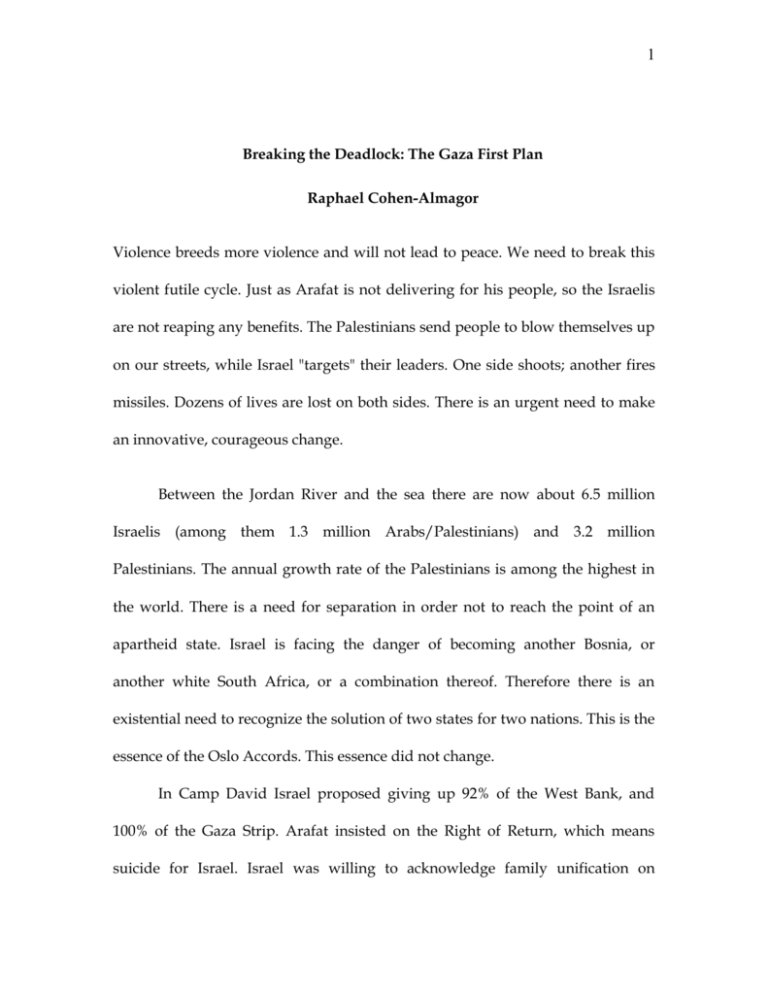
1 Breaking the Deadlock: The Gaza First Plan Raphael Cohen-Almagor Violence breeds more violence and will not lead to peace. We need to break this violent futile cycle. Just as Arafat is not delivering for his people, so the Israelis are not reaping any benefits. The Palestinians send people to blow themselves up on our streets, while Israel "targets" their leaders. One side shoots; another fires missiles. Dozens of lives are lost on both sides. There is an urgent need to make an innovative, courageous change. Between the Jordan River and the sea there are now about 6.5 million Israelis (among them 1.3 million Arabs/Palestinians) and 3.2 million Palestinians. The annual growth rate of the Palestinians is among the highest in the world. There is a need for separation in order not to reach the point of an apartheid state. Israel is facing the danger of becoming another Bosnia, or another white South Africa, or a combination thereof. Therefore there is an existential need to recognize the solution of two states for two nations. This is the essence of the Oslo Accords. This essence did not change. In Camp David Israel proposed giving up 92% of the West Bank, and 100% of the Gaza Strip. Arafat insisted on the Right of Return, which means suicide for Israel. Israel was willing to acknowledge family unification on 2 humanitarian grounds but cannot accept a full scale right of return for all Palestinian refugees. By insisting on this, Arafat stated that he wishes the demise of Israel as a Jewish-Zionist state. I call upon Israeli politicians to push hard the idea of “Gaza first”. This idea was mentioned on the papers without much elaboration. Here I wish to propose a plausible scenario. The Gaza First Plan The Gaza Strip is arguably the most populated piece of earth in the world: 365 square kilometers with more than 1.2 million Palestinians, and some 7,500 Jewish settlers in sixteen settlements. Assuming that the Israeli government approves the idea by a majority vote (presently this is only a wishful thinking), the heads of settlers who reside at the heart of the Gaza Strip, most notably Kfar Darom and Netzarim, will be invited to Prime Minister Sharon. It will be explained to them that the government has decided to pull out the IDF from the Strip, and a honorable solution will be offered to them to resettle them in other parts of Israel. The proposal should be generous, something that the settlers will be happy to accept. This in deep appreciation of their historical role in creating facts in Eretz Israel. This historical role has come to an end. The government of Israel has decided that the costs – in blood and money – are too heavy, and it made a strategic decision that Israel no longer supports settlements at the heart of hostile 3 Palestinian population. Those who decide, nevertheless, to stay will do this on their own risk. The IDF will supply them with arms and other defence mechanisms and it will be clarified that, on a certain date, the IDF will no longer be around to defend them. Pulling out from the heart of the Strip is an Israeli interest. Israel needs to acknowledge that the Strip is Palestinian and that we don’t have a place there. This trust-building step is designed to show that Israel is willing to make territorial concessions. A day after the evacuation, Prime Minister Sharon will call a press conference in which he will explain this step and invite Chairperson Arafat to establish an independent Palestinian state in the Strip while Israel closely scrutinize the region’s security. When asked about Judea and Samaria, the answer will be that this issue is dependent on the Palestinian conduct. If they show that they deserted terrorism and they wish to resolve the conflict, then negotiations will be resumed to deal with all the pertinent issues. Meanwhile, defence mechanism will be erected along the Strip to separate the Palestinian authority from Israel. Gains The cycle of violence brings nothing but more violence. The present tactic (yes, it is a tactic, not strategy) is not a solution. The Gaza First Plan is not very costly and its gains are considerable. In the national arena, Israel’s position will be 4 appreciated: evacuation of major settlements, pulling back the IDF, acknowledging the right of the Palestinians to an independent state. Israel is no longer the strong occupier with “the best military in the ME” but also a wise democracy that is willing to pay a price to reach a solution. From then on, pressure will mount on Arafat to respond positively. The Strip does not have any holly component. Evacuation of settlements in Gaza is very different from evacuation of settlements in Judea and Samaria. This will be a test case for evacuation and resettlement. The answer to the claim that this will be portrayed as a Palestinian victory is that it is an Israeli interest. Israel sees no future in the Strip. It is an essential step to push history in a positive direction. Therefore it is done unilaterally. As Israel found the resourcefulness to evacuate Lebanon, after sacrificing hundreds of young soldiers in vein, so it is time to evacuate the Strip. Dozens of soldiers are been killed in vein, defending the few thousands settlers. It is time to stop this futile madness, this futile bloodshed that will bring no results for Israel. It is time to acknowledge that the Strip is Palestinian, and that we have no share in it. Sovereignty: A significant difference exists between a Palestinian entity and a Palestinian state. With sovereignty comes accountability. There is a price for entering the community of nations. Sovereign countries are expected to overcome terrorist organizations and blood-brokers. A president cannot say that he does not control his own security forces (Arafat has far too many of those), or 5 people. If he cannot control his own people, the national community will clarify that he does not deserve independence and sovereignty. Separation: a test case to examine to what extent this is a useful solution. There are many speculations whether or not this is a viable solution. Instead of speculating, let us examine this issue in practice. Caveat: of course there are many differences between Gaza and Judea and Samaria. The topography is very different. The holly component is missing. There are less settlements in Gaza. So we are talking of a circumscribed test case, but still a test case. Costs and Disadvantages Some will conceive this proposal as surrender. However, this step should have been carried out long time ago, in light of demography and Israel’s yearning to bring peace to our troubled region. We all want peace but not all of us are willing to pay a price for peace. It is time to understand that in order to have peace we need to pay a price. Peace, like any other precious commodity, is costly. Once we reached the conclusion that Israel has no interest in the Strip and that there are no free meals, especially not in the Middle East, it is time to do some constructive steps towards peace. Furthermore, the Palestinians still have a lot to loose. In future negotiations both sides must acknowledge that they have something to gain, and no less importantly, something to loose. The Palestinians will not settle for Gaza 6 only. They will ask for the West Bank, and rightly so. In order to continue the peace process, both sides must show commitment and sincerity. Escalation of terrorism: This is a concrete issue that deserves careful attention. Thus, separation is suggested. The topography of the region is less complicated than the topography of the Bank. Of course, separation entails an economic price, especially to the Palestinians. Therefore, Palestine and Israel may both request economic assistance for Gaza. If there will be quiet, there is more likelihood that international support will be granted. It is an Israeli interest not to suffocate Gaza and enable the Gazans to develop independent economic resources. Sovereignty without a counter Palestinian payment: We need to acknowledge that the Israeli stance till now was wrong. Evidently, a Palestinian independent state is only a matter of time. We’ll be far better off initiating its establishment rather than succumbing to international pressure in due course. Further, as said, sovereignty will entail positive results for Israel. Economic costs: resettling Israeli citizens after their evacuation from Gaza is very costly. This burden might be too heavy for the shaky Israeli economy that knew better days. The government of Israel will need to approach the international community to commit a special fund for this purpose. Israel should not turn its back to the settlers who built their homes in the Strip and resided there for years, some of them for dozens of years. 7 It is time to be active. “Gaza First”, I feel, is a sensible step in the right direction.1 Raphael Cohen-Almagor is associate professor at the University of Haifa, where he heads the Center for Democratic Studies. Currently he spends his sabbatical at Johns Hopkins University, Baltimore. 1. For further discussion, see http://almagor.blogspot.com

